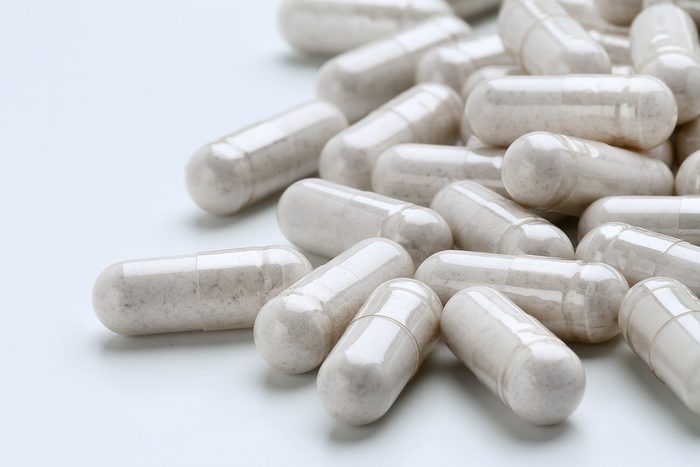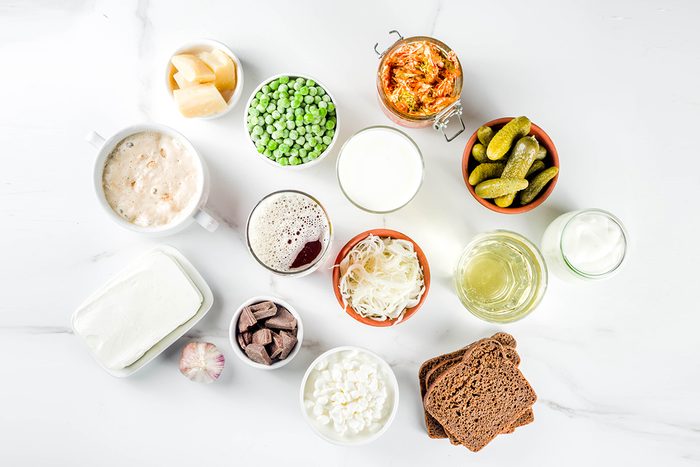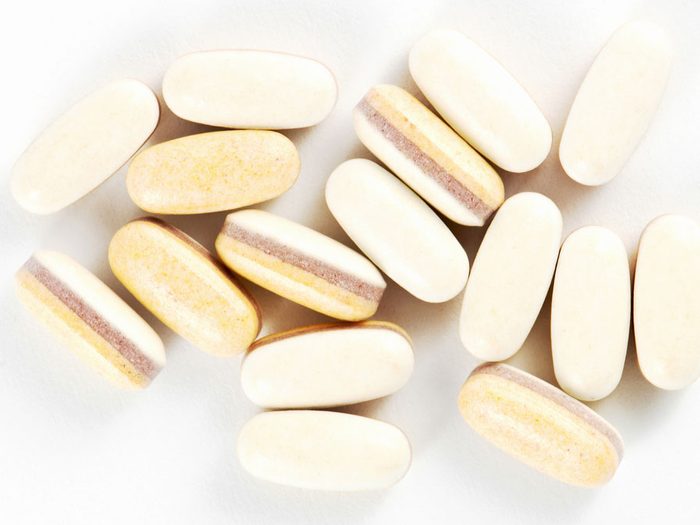
How to take probiotics
There are a few ways to take probiotics—by eating probiotic-rich food (such as yogurt and cheese) and by taking probiotic supplements. No matter what you choose, studies prove probiotics work. They’re widely known as “friendly bacteria” that help maintain a healthy digestive system, and there’s even research to suggest that probiotics can improve your mental health. But are you eating or taking probiotics correctly? Are you storing them properly? These sensitive bacteria need care and attention before they give you those health-boosting benefits. Find out if you’re making any of these mistakes.
(Related: 13 Foods High in Natural Probiotics)

Mistake #1: You store probiotics in your medicine cabinet
The bathroom medicine cabinet (or even a cupboard in the kitchen for that matter) can have fluctuating temperature changes, which will affect moisture in the air, and can compromise the quality of your probiotics.
Probiotic supplements are available in refrigerated and dry formulas. The latter can be kept at room temperature. Probiotic foods and refrigerated supplements must be kept in a cool fridge to keep the bacteria alive.
For dry probiotic supplements, check the packaging on how to store them, but generally, they must be kept in a dry, dark place that’s free of moisture. However, some probiotic capsules are better kept in the fridge, says Mathieu Millette, the scientific director of supplement company BioK. Check the instructions on the package to ensure you’re storing them properly.

Mistake #2: You stop taking probiotics when you take antibiotics
“One of the biggest misconceptions is that you should wait until your antibiotics are finished before you take probiotics,” says registered dietitian Desiree Nielsen, author of Un-Junk Your Diet: How to Shop, Cook and Eat to Fight Inflammation and Feel Better, Forever. People think that antibiotics will kill probiotics, which is true, but probiotics can ease the side effects of antibiotics (such as diarrhea, upset tummy and more). “The key to [probiotics] survival is when you take probiotics: wait two hours after your antibiotic dose so the antibiotic can move through your system and give probiotics a ‘fighting chance’. In addition, continue taking the probiotics after your antibiotics are finished to ensure that their effects are out of your system.”
(Related: 12 Questions to Ask Your Doctor Before Taking Antibiotics)

Mistake #3: You think all probiotics are equal
Not all probiotics provide the same benefits, says Millette. For example, Lactobacillus Acidophilus has been shown to help blood pressure, cholesterol, allergies and digestion. Lactobacillus Rhamnosus can help with blood glucose, immune function and cholesterol. And Lactobacillus helveticus reduces blood pressure, improves sleep quality and bone health.
Check the packaging, talk to your healthcare provider or double-check with a pharmacist to make sure what you’re buying is what you need.

Mistake #4: You take more than one type of probiotic supplement
If you’re considering “layering” your probiotic supplements for different health concerns, know that different bacteria can interact. “Think of it this way: part of the reason we take probiotics is to fight off other bacteria,” says Nielsen. “If you take two different probiotic products at the same time, they can out-compete each other. Research supports this: You can include 10 strains in a single product but without proper study, you can’t be sure that one strain isn’t out-competing the other nine.” Nielsen says to check out the manufacturer’s website for clinical studies that the strains were tested together.
(Related: Everything You Knew About Probiotics Might Be Wrong)

Mistake #5: You’re not prepping your system with prebiotics
Prebiotics are food for good bacteria. But Nielsen warns that most of the research on prebiotics is done with high doses (not always available in supplement form), which can be hard on the stomach, especially for those with gastrointestinal issues like irritable bowel syndrome.
So, how do you get the benefits of prebiotics to get the benefits of probiotics? “I recommend eating a diet high in plant foods, such as fresh fruit, vegetables, legumes and whole grains,” says Nielsen. “A high-fibre, plant-centred diet has been shown to have an overall beneficial effect on the flora, and will naturally include prebiotic foods such as wheat, legumes and onions.”
(Related: Prebiotics vs. Probiotics: What’s the Difference?)

Mistake #6: You put your probiotics into a personalized pill box
Sure, organizing your daily pills and supplements in a handy pill box will help you to remember to take them, but it could compromise how effective your probiotics are. “Like crackers, probiotic capsules will expire more quickly when exposed [to air exposure, temperature changes, light and humidity],” says Millette. And Nielsen agrees. She says to keep your probiotics in sealed individual doses away from bright light and heat.

Mistake #7: You’re not taking the right dose
The dose must be proven effective to make a claim on package in Canada. A dose is measured in colony-forming units (CFU). “Look for a product with at least 10 billion CFU, because that appears to be a minimum dosage across the scientific literature, and take as directed,” says Nielsen.
The best way to ensure you’re getting the most out of your probiotics, experts say, is to follow a balanced high-fibre food plan, understand the type of probiotic you’re taking, review its clinical research, take the appropriate dose and store them according to the package directions. And if you have any concerns talk to your healthcare provider. Then you’ll have no worries that your probiotics are failing you.
